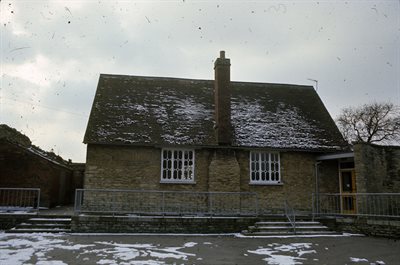Carlton School 1968 to 1972
This page was contributed by Pamela Hider
School Logbooks 1968-1972
The information below is taken from the logbooks for Carlton School for 1968-1972. Logbooks from the 19th and 20th centuries give us a fascinating account of life at schools from the beginning of our national education system and of how education evolved throughout its first hundred years, particularly in a rural setting such as Carlton. They also reflect the many changes in society that took place during that time such as hardship, disease and world wars, through to population growth, the affluent society, a National Health Service, technology and vast opportunities. Access to the logbooks was provided courtesy of the Headteacher of Carlton Primary School.

Carlton Old School 1970s (Courtesy of HER)
The new Headteacher was R.D. Linger & the new Assistant, Miss Egan. Numbers enrolled ranged from 64 in early September 1968 to 103 by October 1972. In order to accommodate these numbers a permanent classroom was to be built, not on the field adjacent to the school which had been discussed in the early 60s, but on a new site nearby, in the Moor. It came into use in September 1969. A further classroom was promised on the Moor site, but it was not forthcoming. Instead a school hall was to be built which was to double as a Village Hall. The rising number of Infants led to 3 classes consisting of Upper Juniors; Lower Juniors with Infants; and Infants. The latter were to occupy the new classroom on the Moor site. Overall Staffing increased from Head plus 2.2 to 3.4. Also, the school was now to be used for teaching practice by student teachers from Bedford College of Education.
New entries in the logbook included talks on road safety given by the Police, which led to Cycling Proficiency tests; a netball court; swimming proficiency badges; a PTA; decimal currency; and a Music Adviser - which led to a visiting music teacher, recorder lessons and the acquisition of percussion instruments. Industrial action by: 1) power workers (Dec 1970) led to a temporary suspension of power to the school, 'We are continuing to operate in partial darkness and with no heating'; and by 2) teachers (1971) which briefly affected two classes. Also, as the school was now on a split site, the role of Head became a non-teaching post in September 1970.
Anthracite continued to fuel a (new) boiler, but ensuing problems led to temperatures of '36°F in the Infants' (Feb 1969) and '4°C' [39°F] in March 1972 'children being taught in the corridor'. Routine visits by Medical personnel were further augmented by an optician. School dinners were so popular at both sites that extra canteen staff were taken on. Educational Advisers and Inspectors made occasional visits and February 1972 saw the last of County Selection Assessment Tests. Outings were made to such faraway places as: Wembley stadium to watch football; Natural History Museum; Greenwich; Hampton Court; Kew Gardens; and Windsor & Runnymede. And for the younger children to Wellingborough Zoo and Woburn Animal Kingdom. Christmas Carol Concerts were now supplemented by Nativity Plays held in both units and the church to raise money for charity. 'Joseph Jazz' was performed by the Bridgend children in June 1971.
Both the Headteacher, Mr. Linger, and his Assistant, Miss Egan, left the school in July 1972 and 'John Fitz (County Supply Staff) took charge of the school as Acting Head' from September to December. September 1972 was one hundred years to the month since Mr. Simpson took charge in 1872. The School Centenary was marked on October 6th by a service held at St. Mary's church Carlton where the address was given by Canon Jenkins of St. Albans Abbey. In attendance were 103 children, various dignitaries, parents and friends. An exhibition was held in the Bridgend classroom in the evening. Many "old students" came along from '1911-1920, 1921-1930, 1928-1938'. And 'Here … a commemorative scroll was presented to the school on behalf of the National Society'.